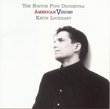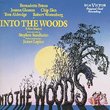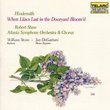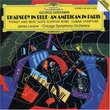| All Artists: Percy Grainger, Thomas [1] Simpson, Eric [Composer] Coates, Frederick Fennell, Harold Lawrence, Eastman-Rochester Pops Orchestra, London Pops Orchestra Title: Fennell Conducts Grainger & Coates Members Wishing: 0 Total Copies: 1 Label: Philips Release Date: 5/11/1993 Genres: Dance & Electronic, Jazz, Special Interest, Classical Styles: Swing Jazz, Marches, Historical Periods, Baroque (c.1600-1750), Modern, 20th, & 21st Century, Symphonies Number of Discs: 1 SwapaCD Credits: 1 UPC: 028943433020 |
Search - Percy Grainger, Thomas [1] Simpson, Eric [Composer] Coates :: Fennell Conducts Grainger & Coates
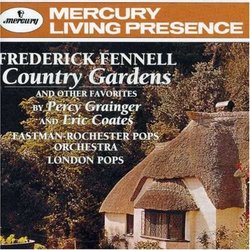 | Percy Grainger, Thomas [1] Simpson, Eric [Composer] Coates Fennell Conducts Grainger & Coates Genres: Dance & Electronic, Jazz, Special Interest, Classical
No Description Available. Genre: Classical Music Media Format: Compact Disk Rating: Release Date: 11-MAY-1993 ![header=[] body=[This CD is available to be requested as disc only.]](/images/attributes/disc.png?v=15401716) ![header=[] body=[This CD is available to be requested with the disc and back insert.]](/images/attributes/disc_back.png?v=15401716) ![header=[] body=[This CD is available to be requested with the disc and front insert.]](/images/attributes/disc_front.png?v=15401716) ![header=[] body=[This CD is available to be requested with the disc, front and back inserts.]](/images/attributes/disc_front_back.png?v=15401716) |
Larger Image |
CD DetailsSynopsis
Product Description No Description Available. Genre: Classical Music Media Format: Compact Disk Rating: Release Date: 11-MAY-1993 Similarly Requested CDs
|
CD ReviewsGood music but not top level perfromance William F. Bell | Murray, Kentucky -- USA | 11/27/1999 (3 out of 5 stars) "This CD holds some wonderful music (that of Percy Grainger) and I hold great respect for both Frederick Fennell and the University of Rochester. But there are a few flaws on this CD. First, the performing hall is about as dead as can be. There is are no acoustics that would normally add to such a performance. But that is a small detail. Second, one of my big complaints is Irish Tune from County Derry. The soft section featuring the high strings has sections that are played out of tune. And, in the background, a double bass can be heard tuning his strings or lightly playing for some reason I can't imagine. Third, I suppose my only other complaint would be that some of the performances seem rather flat. They just lack the emotion that these songs require. On the other hand, though, this CD holds some wonderful things. Country Gardens, Shepherd's Hey, Children's March, Mock Morris, and Handel in the Strand are all superbly done (aside from the small complaints made earlier). It boils down to this: If you really like Percy Grainger, then the CD is worth getting. If you dislike or only moderately enjoy Grainger's music, this CD is probably not worth getting." Fennell's Grainger & Coates Robert E. Nylund | Ft. Wayne, Indiana United States | 12/31/2003 (5 out of 5 stars) "Famed American band conductor Frederick Fennell turned to British music in this highly enjoyable compilation of music by Percy Grainger and Eric Coates, who both lived during the first half of the twentieth century. Grainger (1882-1961), who was actually born in Australia and later became an American citizen, authorized and approved the recordings of some of his more popular compositions and arrangements. Like Bela Bartok and Zoltan Kodaly, Grainger collected folk music and some of those pieces are represented on this CD. One of the most familiar tunes is "Irish Tune from County Derry," which is better known as the melody for "Danny Boy." It is given a particularly sensitive, lovely, and lyrical performance by the Eastman Rochester "Pops" Orchestra under Fennell. The works are generally light and lively, expertly played by the musicians of the Eastman School of Music, where these recordings were made in 1959. The sound is typically top-notch, taken from the original triple track stereophonic tapes that were part of Mercury's "Living Presence" series. Some of these pieces were originally written for piano. Grainger himself was a very capable pianist, as can be heard in some of the Columbia acoustical recordings he made in 1922. The orchestrations are generally rich and colorful. "The Immovable Do" was inspired by a stuck note on a small organ. The "Do" is actually "doe," as in "do-re-mi." It is highly original and very charming. All of the works have special, endearing qualities and are often very entertaining. In a way, this is classical music for people who say they don't like classical music; for those who do like classical music, this is a pleasant change-of-pace. With the London "Pops" Orchestra, Fennell later recorded a three-movement suite by Eric Coates (1886-1957), who is best known for his light classical works, notably the "London Suite" and the "London Again Suite," works that Coates himself recorded for English Columbia (which usually utilized EMI engineers in London). "The Three Elizabeths" pays tribute to three members of British royalty. "Halcyon Days" salutes Queen Elizabeth I; "Springtime in Angus" honors Elizabeth, the Queen Mother; and "Youth of Britain" honors Princess Elizabeth, who became Queen Elizabeth II. Typically, Coates music has great charm and memorable melodies. The performance here is quite delightful." Music from the Soil Stephen Maxam | State of Maine, USA | 03/29/2000 (5 out of 5 stars) "Grainger was one of the group of British composers at the turn of the century who were fascinated by the oral tradition folk songs which were starting to disappear from the earth. Holst, Vaughan-Williams, Delius, Butterworth, all wrote distillations of this wonderful music. Grainger even recorded it. This recording does have a few oddities about it. Perhaps Fennell could be said to not have "been in touch with his feminine side", so slower, lyrical pieces may not his forte, but in some cases they can have a hypnotic quality. The County Derry certainly does have sentiment. His performances are marked with exhilarating virility, and he has a strong passion which maybe had a chance to show itself better with the wind ensemble recordings, but this one still has the Fennell energy and love. Also, he may have considered a symphony orchestra to be a wind ensemble surrounded by strings, but I forgive him it because he so lovingly "dished up"* a fine collection of Grainger for us, and anyway, Grainger may have shared the view as well. Grainger didn't give us a lot of time to see and feel the places and perceptions in any of his short pieces, but if you catch them, they are certainly there, and Fennell I think caught them and knew them as well. Molly on the Shore has these brief, mystical moments. Grainger is so worth pursuing, this recording is a must, and so are the other Fennell/Grainger recordings. I really don't think anyone has sensed the poignant beauties in Grainger's little jewels as well as Fennell. *Favorite Grainger phrase, e.g., "Molly on the Shore, Dished Up For Piano""
|

 Track Listings (14) - Disc #1
Track Listings (14) - Disc #1